#Chinese Empress
Explore tagged Tumblr posts
Text

Empress Wanrong of China, early 20th century
#manchu#mdpchina#china#20th c. china#photography#costume#mdpcostume#chinese costume#chinese dress#chinese empress
31 notes
·
View notes
Text
Empress Xiaolie of the Ming Dynasty (1534-1547)
Lady Fang was born in 1516 and grew up in the Nanjing area. She was selected to become an imperial concubine in 1531 at the age of 15. Despite never sharing a bed with the Jiajing Emperor she was chosen to become his third empress consort just nine days after Empress Zhang was deposed. The reason for her ascension is most likely because she had sided with the emperor during one of his disputes with court officials over honoring imperial ancestors. For the first several years as empress Lady Fang was described as being the favorite spouse of the emperor.
Their relationship would be damaged after the Renyin Palace Rebellion in 1542. In October of that year sixteen palace maids conspired to assassinate the emperor for being exceedingly cruel to the palace women. It’s reported that the Jiajing Emperor had up to 200 palace maids beaten to death during his reign. The maids attacked the emperor when she was spending the night with his favorite concubine, Consort Duan, and attempted to strangle him. During the attack one of the women became afraid and ran to Lady Fang. Lady Fang would rush in and save the emperor’s life.
As the emperor was in an extreme state of shock after this attempt, Lady Fang took control of the situation and had all sixteen maids and Consort Duan executed. The emperor was upset after Consort Duan’s execution and refused to believe she was involved with the attempt. He would blame Lady Fang for Consort Duan’s death and their relationship never recovered. Lady Fang reportedly became depressed after this.
In 1547, Lady Fang would become trapped in a fire. An eunuch asked the Jiajing Emperor if they should try to save her, but the emperor refused to answer and as a result Lady Fang burned to death. Despite blaming her for his favorite concubine's death and letting her burn to death, the emperor granted her all honors after her death.
Titles:
Lady Fang (from 1516)
Concubine De (from 1531)
Empress (from 1534)
Empress Xiaolie (posthumous from 1547)
13 notes
·
View notes
Text
Battle of the Barbies! Round 7: Historical (Sub Round 4)


This is round 7 (sub round 4) of the bracket. All other polls in can be found here.
#Battle of the barbies#barbie#barbies#barbie doll#barbie dolls#barbie collectibles#barbie collector#barbie core#doll#dolls#dollcore#doll collector#doll collection#doll community#my post#non disney#polls#historical dolls#historical barbies#chinese empress#empress#30s
25 notes
·
View notes
Text
Wu Zetian
Wu Zetian, the first and only female ruler of Imperial China, lived a life marked by ambition as well as controversy. Born into a wealthy family in 624 CE, Wu was encouraged by her father to pursue education, an uncommon privilege for girls in ancient China. Selected as a concubine for Emperor Taizong at age 14, Wu's intellect and charm quickly captured the emperor's attention, leading to her elevation to the position of secretary. Her rise to power was gradual yet strategic. Despite being sent to a convent after Taizong's death, Wu's affair with Taizong's son, Gaozong, secured her return to court as his empress consort. With Gaozong's declining health, Wu's influence grew, and she effectively ruled as the power behind the throne, manoeuvring court politics to eliminate rivals and solidify her position. Wu's reign was marked by significant reforms and achievements. She restructured the government, reduced bureaucracy, and implemented policies to improve agriculture, education, and military efficiency. However, her later years saw a decline in her hold on power, characterised by paranoia, scandalous affairs with young lovers, and purges within her administration. In 704 CE, Wu was forced to abdicate in favour of her son Zhongzong due to mounting discontent among court officials. After her death in 705 CE, real power shifted to Empress Wei, who played a role in influencing Zhongzong and the court. Despite controversy surrounding her reign, Wu's legacy endures. Modern historians acknowledge her as a visionary leader whose reforms laid the groundwork for China's prosperity under Emperor Xuanzong. While remembered for her supposed crimes, including the rumoured murder of her daughter, Wu's impact on Chinese history remains profound, inspiring continued fascination and debate about her rule and legacy. She ruled during the Tang Dynasty and establishing her own Zhou Dynasty, leaving an indelible mark on the history of China.
I also highly suggest watching the series on YouTube by Extra History
youtube
this is the link for part 1 ^
#wu zetian#chinese empress#chinese history#tang dynasty#zhou dynasty#imperial china#empress#women in history#women throughout history#Youtube
17 notes
·
View notes
Text
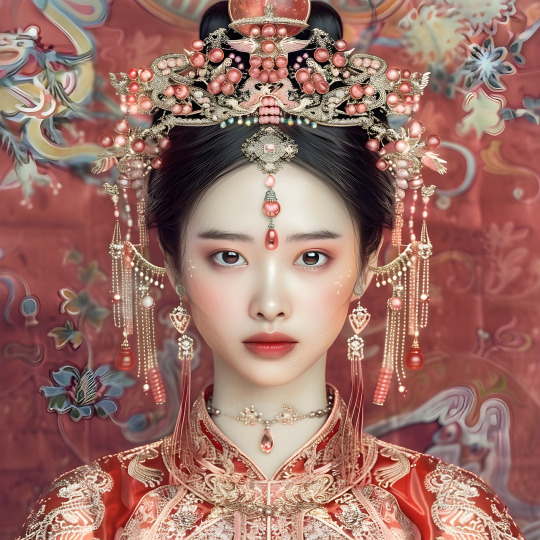
Noooooooooooo, Pixabay allow AI Images like this one! AI creeps everywhere. From writing stories, to art, to music, to... writing email for you? WHY, WHY, WHY!?!
I know Tiktok allow AI stuffs too. Who next???
#ai art#anti ai#fuck ai art#fuck ai#chinese woman#china#empress#chinese empress#illustration#pixabay#ai generated#ai image#ai artwork#ai girl#ai is theft#ai is not art#ai issues
8 notes
·
View notes
Text
My Chinese royalty Barbies 🖤

She is the Chinese Empress from the Great Eras collection, rebodied onto a Model Muse body.
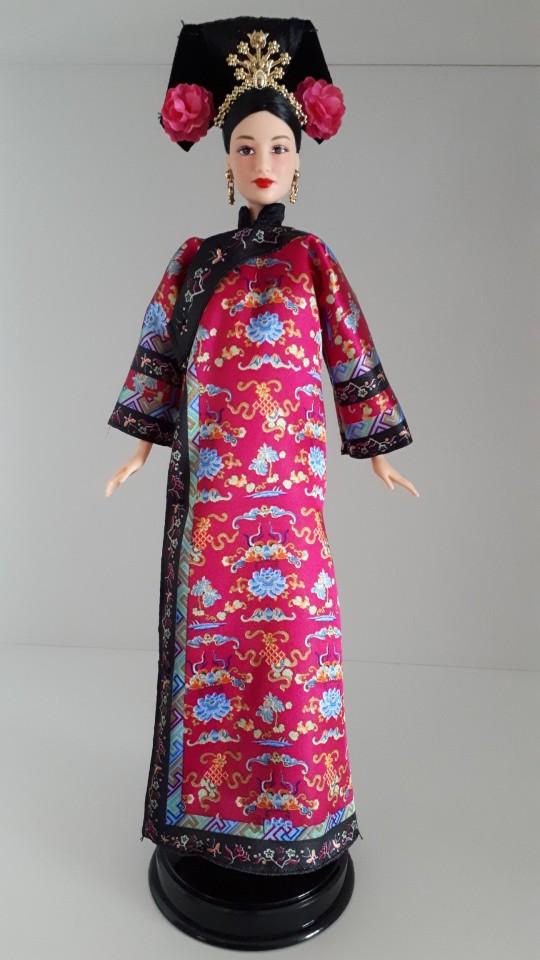
And Princess of China from the Dolls of the World Princess collection.
#thegreymoon's dolls#barbie#chinese empress#great eras#princess of china#dolls of the world#the princess collection
5 notes
·
View notes
Text
Summoned a new Caster-class Servant:



💜 Wu Zetian! 💜






#fgo#Wu Zetian Caster#fgo wu zetian#Wu Zetian (Caster)#wu zetian#fate/grand order#Fate/Grand Order Wu Zetian#Fate Grand Order Wu Zetian#fate grand order#fate/grand order: cosmos in the lostbelt#fate go#fgo usa#heroic spirit#type moon#lasengle#type-moon#Caster-Class#Caster Class#Bu Zokuten#武則天#Wu Zhao#Great Sacred Empress Zetian#fate grand order cosmos in the lostbelt#anime#FGO swimsuit#Nite Brite#Fūyā-chan#arctic summer world#Chinese Empress#Arctic Summer World Chaldea’s Magical Summer Theme Park
1 note
·
View note
Text
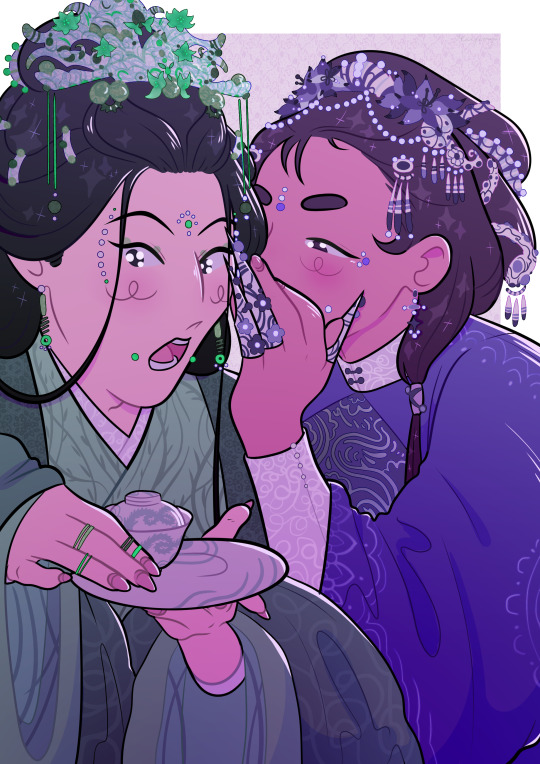
The Northern Consort used to be a spy, don't you know? A good one, too...only the heavens know how far that particular web goes, but it benefits the Emperor's reign, and the Empress is found of him, so who are we to judge, eh?
[+200 Better Lore points!]
Empress Shen is finally here, my God! How difficult was this particular beast, eh? It took me, like, five or six redesigns! The balance between feminine and masculine really kicked my ass here...I think I did pretty well, if you take in account everything. I'm proud of myself, so all of you must be nice to me.
The drama is set during the warring states period, my inspiration was mostly from how they costumed the Queen of Zhao, the dowager Queen of Qin and Haolan when she finally becomes the Queen of Qin. They are all gorgeously dressed, I recommend watching it PURELY for the costuming and also the scheming women.
The design was immensely inspired by the Chinese drama The Legend of Haolan. The main character just has this impeccable Shen Qingqiu face-card, every time I see her I just think 'Yes, Shen Qingqiu, for sure.' Here's her, for reference:
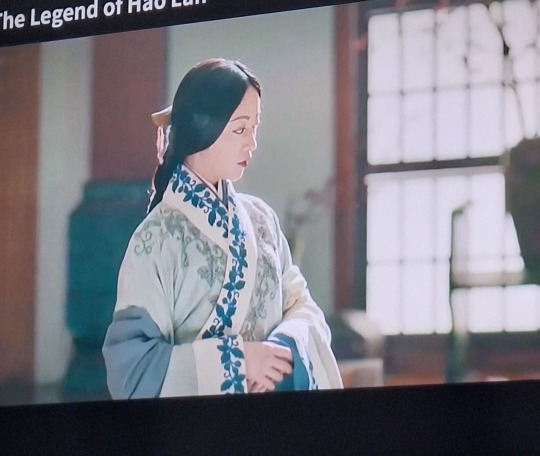
For Shang Qinghua, things were so much easier, though; I watched some episodes of Story of Yanxi Palace and was struck by inspiration™. He was so easy to draw! It's all very Qing dynasty inspired, it just fits him, I think.
It took me so very long to draw the jewellery and the embroidery in both of them...I admire the people who actually do metal and needlework. Heroes, all of them.
The pearl makeup is one of my favourite ancient Chinese makeup trends; I just had to put it in. It's a very fancy form of Huadian, which is where you draw forms, mostly flowers and other pretty things on your face using paints, powders, pearls, gems and glued flowers, and it was popular from the Tang dynasty onwards. The ICONIC pearl Huadian was popularized in the Song dynasty because it (shockingly) represented modesty and elegance.
Shen Qingqiu's greenest ornaments are made out of imperial jade, which is characterized by this vibrant emerald green colour and great translucency. It's also the most expensive type of jade ever.
The! Nail! Guards! Make! A! Comeback!
Shang Qinghua's ornaments are, in the other hand, made out of pearls - for elegance, wisdom, and wealth, and blue jade, for serenity, peace of mind and self-reflection. Mobei-jun buys all of his husband's jewellery with intention, for sure.
They're such big gossips omg, nobody is safe.
#artists on tumblr#digital art#art#my art#fanart#svsss#scum villain fanart#scum system#scum villian self saving system#scum villain#cumplane#airplane bro#shang qinghua#shen qingqiu#shen yuan#cucumber bro#peerless cucumber#airplane shooting towards the sky#hanfu accessories#hanfu fashion#chinese hanfu#hanfu#bingqiu#moshang#consort#empress#historical fashion
2K notes
·
View notes
Text

Cai Liang: Empress' New Clothes
521 notes
·
View notes
Photo



Legend of Zhen Huan :: Zhen Huan’s blue and pink dianzi
#legend of zhen huan#cdrama#perioddramaedit#cdramanet#cdramaedit#cdramagifs#gzh#empresses in the palace#qing dynasty#甄嬛传#hairstyles#dianzi#zhhair#zhdianzi#gifshistorical#asiandramanet#perioddramasource#onlyperioddramas#chinese drama
74 notes
·
View notes
Text
Empress Xiaozhenxian of the Qing Dynasty (1852-1861)

Most famously known as Empress Dowager Ci’an, Empress Xiaozhenxian was born on 12 August 1837 to the Manchu Bordered Yellow Banner Niohuru clan.
She would enter the Forbidden City after participating in a selection in 1851, a year after the Xianfeng Emperor ascended the throne. After entering the forbidden city, She rose up the ranks quickly. She was named Concubine Zhen on 14 June 1852, then to Noble Consort Zhen in late June or early July of that same year, and then finally was promoted to Empress Consort on 24 July 1852. She gave birth to no children but as Empress Consort she was in charge of raising all the Xianfeng Emperor’s children, including Zaichun the future Tongzhi Emperor.
After the Xianfeng Emperor’s death in August of 1861, Zaichun would be named Emperor. As Zaichun was only five at this time his father named eight of his closest advisors to be regent but Zaichun’s mother, Noble Consort Yi, wanted to reign as regent and convinced Empress Xiaozhenxian to join her. Together with Prince Gong and Prince Chun, two of the Xianfeng’s brothers, they staged the Xinyou Coup and took control of the regency.
Both Noble Consort Yi and Empress Xiaozhenxian would be named Empress Dowager. The Empress was named “Mother Empress, Empress Dowager” and given the honorific name of Ci’an, meaning ‘calm and motherly’. Noble Consort Yi was named “Holy Mother, Empress Dowager” and given the honorific name of Cixi, meaning ‘auspicious and motherly’. Despite both being named Empress Dowager, Ci’an would hold more power then Cixi as she had reigned as Empress previously.
After becoming co-regents, the two would begin to study history and politics to help them rule. Despite ruling for the Tongzhi Emperor, the women were still not allowed to be seen during imperial court sessions, so they would sit behind a curtain during such sessions. It is also believed that despite Ci’an wielding more power, it was Cixi who actually made all the decisions as Ci’an was not interested in politics or power.
Ci’an, and Cixi as well, would resign from being regent to the Tongzhi Emperor after his marriage to Empress Xiaozheyi. They would resume the regency just a year later after Tongzhi fell ill and passed away childless. Cixi’s nephew, and the son of Prince Chun, was decided as the next Emperor but as he was underage the two Empress Dowagers would continue their regency.
Ci’an would die suddenly on 8 April 1881. She had been attending an imperial court session when she began to feel unwell and was escorted back to her rooms. She passed away a few hours later. While she was healthy at the time of her passing, Ci’an had a history of strokes. One stroke in the spring of 1863 had left her unable to speak for a month and she gained a reputation for speaking slowly after this. Her cause of death was listed as a sudden stroke.
Rumors would fly after her death that she was poisoned by Empress Dowager Cixi, who wanted more power, but there has never been any evidence to back up these rumors. Furthermore, Cixi was extremely sick at the time of Empress Dowager Ci'an death so it’s unlikely she was able to do anything.
A valedictory degree was written after Empress Dowager Ci’ans death:
"In spite of the arduous duties of the State, which have fully occupied my time, I was naturally of robust constitution and had therefore fully expected to attain to a good old age and to enjoy the Emperor's dutiful ministrations. Yesterday, however, I was suddenly stricken with a slight illness and his Majesty thereupon commanded his physician to attend me; later his Majesty came in person to enquire as to my health. And now, most unexpectedly, I have had a most dangerous relapse. At 1900 hours this evening I became completely confused in mind and now all hope of my recovery appears to be vain. I am forty-five years of age and for close on twenty years have held the high position of a regent of the empire. Many honorific titles and ceremonies of congratulation have been bestowed upon me: what cause have I therefore to regret?"
Titles:
Lady Niohuru (from August 1837)
Imperial Concubine Zhen (from June 1852)
Noble Consort Zhen (from June/July 1852)
Empress (from July 1852)
Empress Dowager Ci’an (from August 1861)
Empress Xiaozhenxian (from May/June 1881)
#qing dynasty#chinese history#china#chinese empress#empress consorts#empress consorts of china#women in history
10 notes
·
View notes
Text
Battle of the Barbies! Round 7: Historical (Sub Round 2)

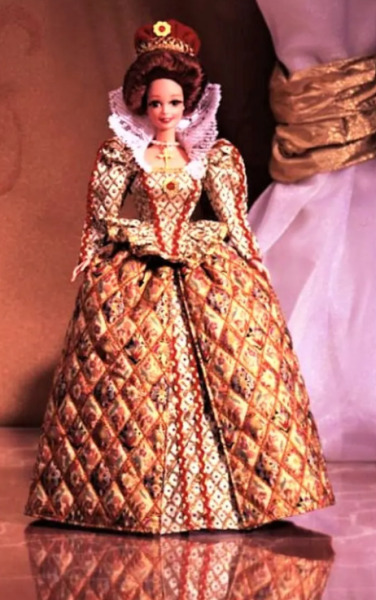
This is round 7 (sub round 2) of the bracket. All other polls in can be found here.
#Battle of the barbies#barbie#barbies#barbie doll#barbie dolls#barbie collectibles#barbie collector#barbie core#doll#dolls#dollcore#doll collector#doll collection#doll community#my post#non disney#polls#historical dolls#historical barbies#chinese empress#elizabethan queen
21 notes
·
View notes
Text
[Hanfu · 漢服]Chinese Western Han (202 BC – 9 AD) Traditional Clothing Hanfu Photoshoot
“这个位子 我有何坐不得?” “我欲问鼎天下,试问谁与争锋”
"Why can't I sit in this seat?"
"I want to conquer the world, who can compete with me?"
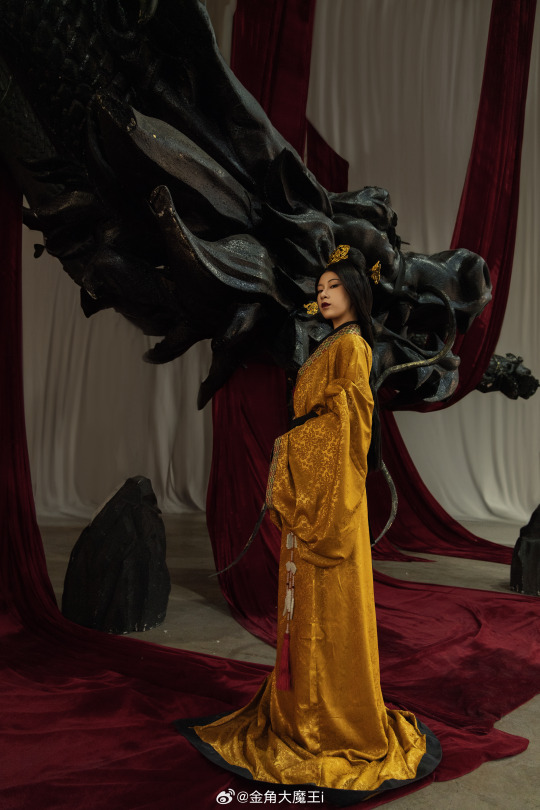
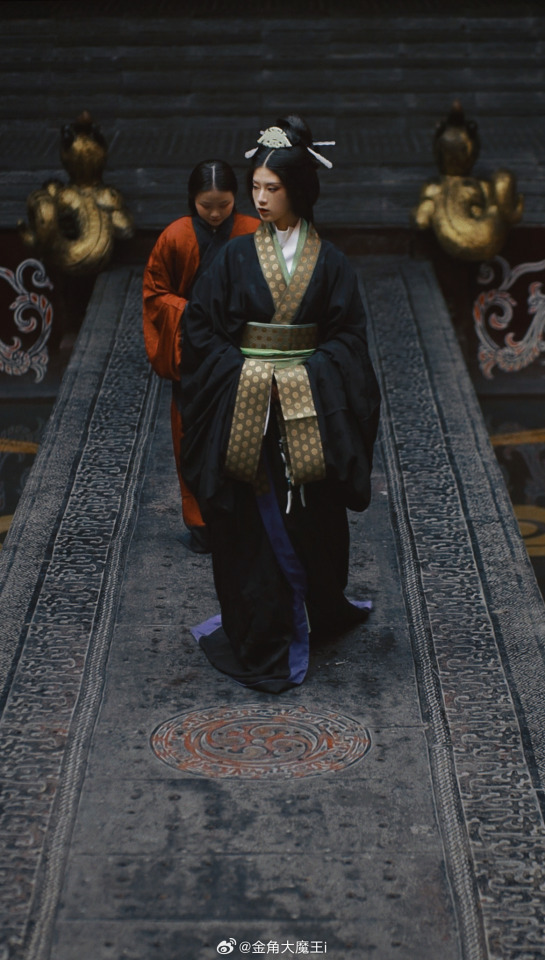
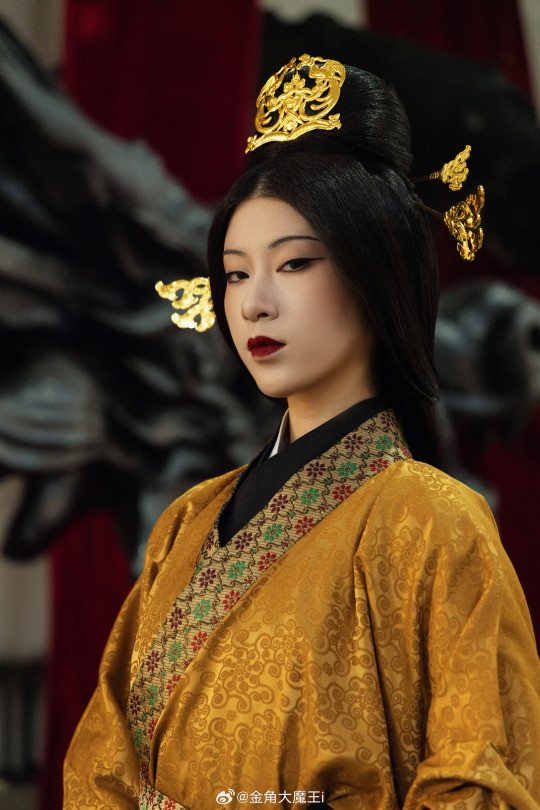
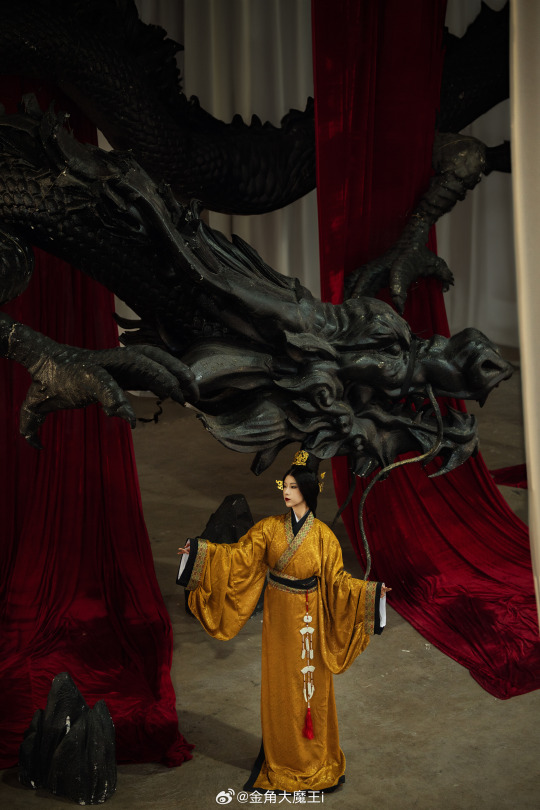

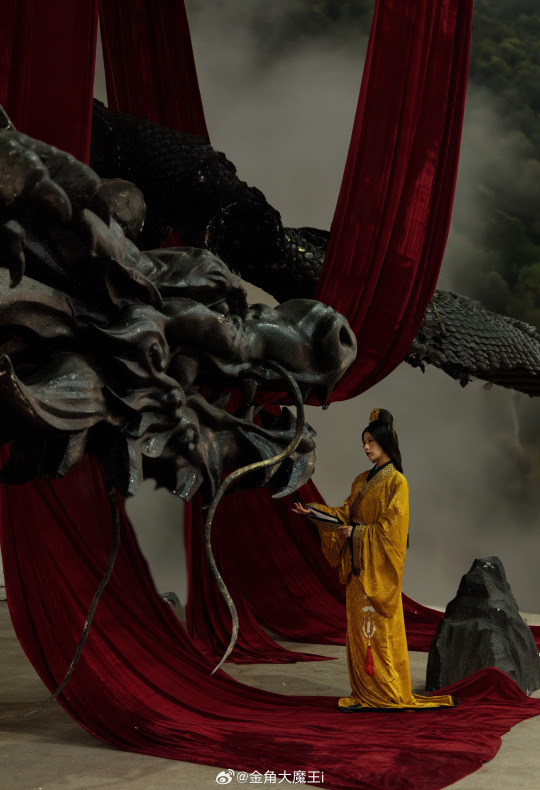


【About The First Empress of the Han Dynasty Empress Lü:Lǚ zhì(吕雉)】
Lü Zhi (241–18 August 180 BC), courtesy name E'xu (娥姁) and commonly known as Empress Lü (traditional Chinese: 呂后; simplified Chinese: 吕后; pinyin: Lǚ Hòu) and formally Empress Gao of Han (漢高后; 汉高后; Hàn Gāo Hòu), was the empress consort of Gaozu, the founding emperor of the Han dynasty. They had two known children, Liu Ying (later Emperor Hui of Han) and Princess Yuan of Lu. Lü was the first woman to assume the title Empress of China and paramount power. After Gaozu's death, she was honoured as empress dowager and regent during the short reigns of Emperor Hui and his successors Emperor Qianshao of Han and Liu Hong (Emperor Houshao).
She played a role in the rise and foundation of her husband, Emperor Gaozu, and his dynasty, and in some of the laws and customs laid down by him. Empress Lü, even in the absence of her husband from the capital, killed two prominent generals who played an important role in Gaozu's rise to power, namely Han Xin and Peng Yue, as a lesson for the aristocracy and other generals. In June 195 BC, with the death of Gaozu, Empress Lü became, as the widow of the late emperor and mother of the new emperor, Empress Dowager (皇太后, Huángtàihòu), and assumed a leadership role in her son's administration. Less than a year after Emperor Hui's accession to the throne, in 194 BC, Lü had one of the late Emperor Gaozu's consorts whom she deeply hated, Concubine Qi, put to death in a cruel manner. She also had Concubine Qi's son Liu Ruyi poisoned to death. Emperor Hui was shocked by his mother's cruelty and fell sick for a year, and thereafter no longer became involved in state affairs, and gave more power to his mother. As a result, Empress dowager Lü held the court, listened to the government, spoke on behalf of the emperor, and did everything (臨朝聽政制, "linchao ting zhengzhi"). With the untimely death of her 22-year-old son, Emperor Hui, Empress dowager Lü subsequently proclaimed his two young sons emperor (known historically as Emperor Qianshao and Emperor Houshao respectively). She gained more power than ever before, and these two young emperors had no legitimacy as emperors in history; the history of this 8-year period is considered and recognized as the reign of Empress Dowager Lü. She dominated the political scene for 15 years until her death in August 180 BC, and is often depicted as the first woman to have ruled China. While four women are noted as having been politically active before her—Fu Hao, Yi Jiang, Lady Nanzi, and Queen Dowager Xuan—Lü was the perhaps first woman to have ruled over united China.
Lü Zhi was born in Shanfu County (單父; present-day Shan County, Shandong) during the late Qin Dynasty. Her courtesy name was Exu (Chinese: 娥姁; pinyin: Éxǔ). To flee from enemies, her father Lü Wen (呂文) brought their family to Pei County, settled there, and became a close friend of the county magistrate. Many influential men in town came to visit Lü Wen. Xiao He, then an assistant of the magistrate, was in charge of the seating arrangement and collection of gifts from guests at a banquet in Lü Wen's house, and he announced, "Those who do not offer more than 1,000 coins in gifts shall be seated outside the hall." Liu Bang (later Emperor Gaozu of Han), then a minor patrol officer (亭長), went there bringing a single cent and said, "I offer 10,000 coins." Lü Wen saw Liu Bang and was so impressed with him on first sight, that he immediately stood up and welcomed Liu into the hall to sit beside him. Xiao He told Lü Wen that Liu Bang was not serious, but Liu ignored him and chatted with Lü. Lü Wen said, "I used to predict fortunes for many people but I've never seen someone so exceptional like you before." Lü Wen then offered his daughter Lü Zhi's hand in marriage to Liu Bang and they were wed. Lü Zhi bore Liu Bang a daughter (later Princess Yuan of Lu) and a son, Liu Ying (later Emperor Hui of Han).
Liu Bang later participated in the rebellion against the Qin Dynasty under the insurgent Chu kingdom, nominally-ruled by King Huai II. Lü Zhi and her two children remained with her father and family for most of the time during this period.
Even after Emperor Gaozu (Liu Bang)'s victory over Xiang Yu, there were still unstable areas in the empire, requiring the new government to launch military campaigns to pacify these regions thereafter. Gaozu placed Empress Lü Zhi and the crown prince Liu Ying (Lü Zhi's son) in charge of the capital Chang'an and making key decisions in court, assisted by the chancellor Xiao He and other ministers. During this time, Lü Zhi proved herself to be a competent administrator in domestic affairs, and she quickly established strong working relationships with many of Gaozu's officials, who admired her for her capability and feared her for her ruthlessness. After the war ended and Emperor Gaozu returned, she remained in power and she was always influential in many of the country's affairs.
In his late years, Emperor Gaozu started favouring one of his younger consorts, Concubine Qi(戚夫人), who bore him a son, Liu Ruyi, who was instated as Prince of Zhao in 198 BC, displacing Lü Zhi's son-in-law Zhang Ao (Princess Yuan of Lu's husband). Gaozu had the intention of replacing Liu Ying with Liu Ruyi as crown prince, reasoning that the former was too "soft-hearted and weak" and that the latter resembled him more. Since Lü Zhi had strong rapport with many ministers, they generally opposed Gaozu's decision but the emperor seemed bent on deposing Liu Ying. Lü Zhi became worried and she approached Zhang Liang for help, and the latter analysed that Gaozu was changing the succession on grounds of favouritism. Zhang Liang invited the "Four Whiteheads of Mount Shang", a group of four reclusive wise men, to persuade Gaozu to change his decision. The four men promised to assist Liu Ying in future if he became emperor, and Gaozu was pleased to see that Liu Ying had their support. Gaozu told Concubine Qi, "I wanted to replace (the crown prince). Now I see that he has the support of those four men; he is fully fledged and difficult to unseat. Empress Lü is really in charge!" This marked the end of the dispute over the succession and affirmed Liu Ying's role as crown prince.
In June 195 BC, Emperor Gaozu died and was succeeded by Liu Ying, who became historically known as Emperor Hui of Han. Lü Zhi was honoured by Emperor Hui as empress dowager. She exerted more influence during the reign of her son than she had when she was empress, and she became the powerful and effective lead figure in his administration.
Lü Zhi did not harm most of Gaozu's other consorts and treated them according to the rules and customs of the imperial family. For example, consorts who bore male children that were instated as princes were granted the title of "Princess Dowager" (王太妃) in their respective sons' principalities. One exception was Concubine Qi, whom Lü Zhi greatly resented because of the dispute over the succession between Liu Ruyi (Qi's son) and Liu Ying. Liu Ruyi, the Prince of Zhao, was away in his principality, so Lü Zhi targeted Concubine Qi. She had Qi stripped of her position, treated like a convict (head shaved, in stocks, dressed in prison garb), and forced to do hard labour in the form of milling rice.
Roles in the deaths of Concubine Qi and Liu Ruyi
Lü Zhi then summoned Liu Ruyi, who was around the age of 12 then, to Chang'an, intending to kill him together with his mother. However Zhou Chang (周昌), the chancellor in Liu Ruyi's principality, whom Lü Zhi respected because of his stern opposition to Emperor Gaozu's proposal to make Liu Ruyi crown prince, temporarily protected Liu Ruyi from harm by responding to Lü Zhi's order that, "The Prince of Zhao is ill and unfit for travelling over long distances." Lü Zhi then ordered Zhou Chang to come to the capital, had him detained, and then summoned Liu Ruyi again. Emperor Hui tried to save Liu Ruyi by intercepting his half-brother before the latter entered Chang'an, and kept Liu Ruyi by his side most of the time. Lü Zhi refrained from carrying out her plans for several months because she feared that she might harm Emperor Hui as well.
One morning in the winter of 195-194 BC, Emperor Hui went for a hunting trip and did not bring Liu Ruyi with him because the latter refused to get out of bed. Lü Zhi's chance arrived, so she sent an assassin to force poisoned wine down Liu Ruyi's throat. The young prince was dead by the time Emperor Hui returned. Lü Zhi then had Concubine Qi killed in an inhumane manner: she had Qi's limbs chopped off, eyes gouged out, ears sliced off, nose sliced off, tongue cut out, forced her to drink a potion that made her mute, and had her thrown into a latrine. She called Qi a "human swine" (人彘). Several days later, Emperor Hui was taken to view the "human swine" and was shocked to learn that it was Concubine Qi. He cried loudly and became ill for a long time. He requested to see his mother and said, "This is something done not by a human. As the empress dowager's son, I'll never be able to rule the empire" From then on, Emperor Hui indulged himself in carnal pleasures and ignored state affairs, leaving all of them to his mother, and this caused power to fall completely into her hands.
When Lu first came to the court, she planned to establish the Lu family members as "kings (nobles)". This was not only to commemorate her deceased relatives, but also to strengthen her power in the court. However, Wang Ling, the prime minister at the time, immediately pointed out that the great ancestor Liu Bang(Husband of Lu, founding emperor of Han Dynasty)once killed the white horse and agreed that "if someone who are not Liu family be come the king, the whole world should attack them." Therefore, the move of establishing a foreign surname as the king violated the ancestral system established by Liu Bang and was really inappropriate.
Faced with the obstruction of Wang Ling, Empress Lu responded by deposing him and insisting on honoring her deceased father and two brothers as King Lu Xuan, King Wu Wu, and King Zhao Zhao. After setting this precedent, Lu was out of control. She not only named her three nephews Lu Tai, Lu Chan, and Lu Lu as King Lu, King Liang, and King Zhao respectively, but also named her grandnephew Lu Tong. He was the King of Yan, and his grandson Zhang Yan was granted the title of King of Lu.
In addition, there are also quite a few people with the surname Lu who have been granted the title of marquis. As a result, it can be said that many princes surnamed Lu appeared in the court in the blink of an eye. They controlled the government and became the cornerstone and support for Empress Lu to control the right to speak in the court.
Empress Lu's life was emblematic of the intricate power dynamics of the Han Dynasty in ancient China. Born into a modest family, Lu rose to prominence through her marriage to Emperor Gaozu. Her astute political acumen and strategic alliances allowed her to wield significant influence behind the throne. As the mother of several emperors, she orchestrated their ascensions and manipulated court politics to consolidate power for her family. However, her ruthless pursuit of control and elimination of rivals earned her both admirers and enemies. In the end, her ambitions led to her downfall, as her unchecked power and manipulation of succession angered the nobility.As a result, after her death, the Lu family was retaliated and killed by the nobles and courtiers who supported the Han Dynasty, and the family was almost exterminated.Empress Lu's life illustrates the delicate balance of power, ambition, and intrigue in ancient Chinese imperial courts.
Literati in every dynasty in China often likened women who attempted to participate in government affairs and influence national policies to Empress Lü, saying they were vicious. One of them was Wu Zetian, the first official female emperor of China. However, compared with Empress Lü, Wu Zetian was more talented. Unlike Empress Lü, who was simply vicious, she ignored the system and stability of the empire and put personal and family interests first.
________________
📸Photo & Model :@金角大魔王i
🔗Weibo:https://weibo.com/1763668330/NFVOXthxX
________________
#chinese hanfu#Western Han (202 BC – 9 AD)#hanfu#Empress Lü#Lǚ zhì(吕雉)#china history#chinese history#hanfu accessories#hanfu_challenge#chinese traditional clothing#china#chinese#woman in history#漢服#汉服#中華風#金角大魔王i#historical fashion
324 notes
·
View notes
Text
New Taiwanese Goddess
I belong to the "Book of Xian and Shen" (BOXS), a project recording Chinese folk gods from East and Southeast Asia (or wherever else they pop up). I just found a goddess who hasn't been recorded yet, the "Female Wealth Deity" (Nu caishen, 女財神). She is presented as the deified form of Empress Wu Zetian (武則天). This is likely because Wu is considered the richest woman in history.
This is interesting as Wealth Gods (Caishen, 財神) are normally male.

I learned about the goddess by chance when I walked past a bike with an advert for her New Taipei temple attached to the back.

I might visit the temple this weekend to learn more about her.
#Chinese religion#Chinese folk religion#goddess#god#shen#god of wealth#goddess of wealth#Wu Zetian#Tang dynasty#Wu Zhou dynasty#Empress#Taiwanese religion#Taiwanese folk religion
65 notes
·
View notes
Text

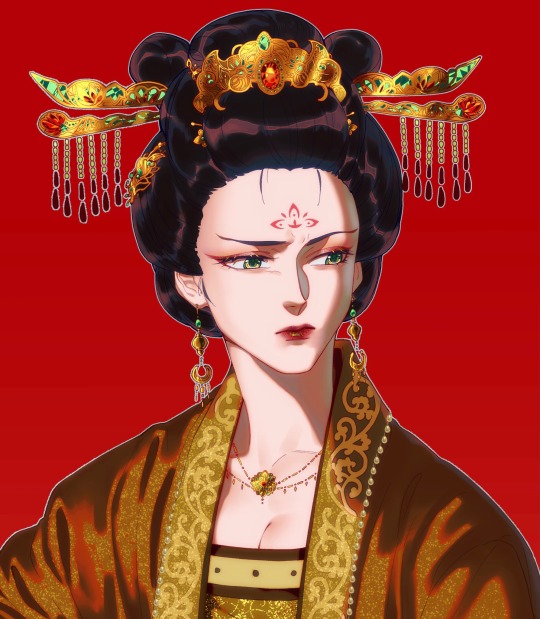
🔥👑 Fearsome empress 👑🔥
195 notes
·
View notes
Text







Women in History Month (insp) | Week 3: Consorts and concubines
#historyedit#perioddramaedit#women in history#women in history month challenge#my edits#mine#isabella of parma#imperial noble consort dunsu#eleanor of toledo#ines de castro#mme du barry#eugenie of montijo#empress fu shou#austrian history#chinese history#italian history#french history#portugese history#18th century#15th century#3rd century#14th century#19th century
150 notes
·
View notes